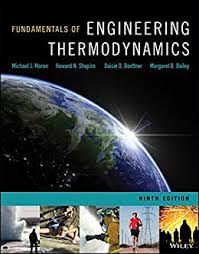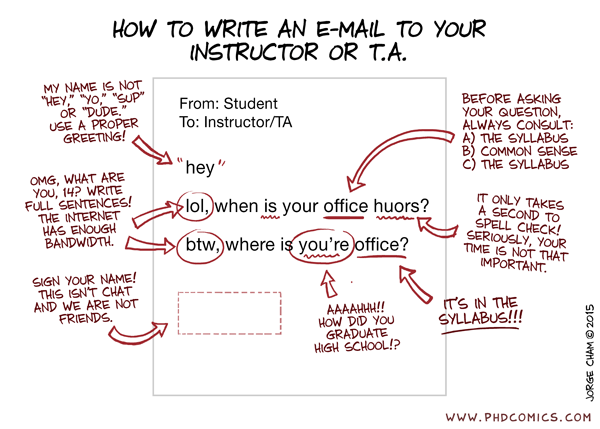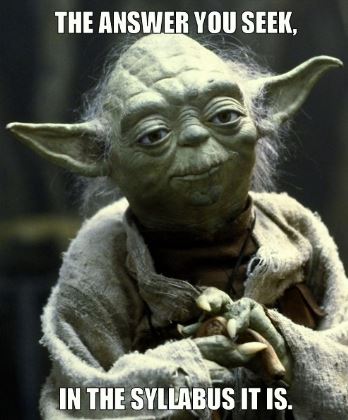Syllabus
Catalog description
Catalog Description: (Prerequisities: ES 201 with a grade of C or better or CE205) Extends the conservation and accounting framework to examine energy-conversion systems. Topics include thermodynamic properties of pure substances, gas mixtures, exergy analyses, power and refrigeration cycles, psychrometric processes, combustion, and propulsion.
Instructors
 |  | ||
 |
Course level objectives
After successful completion of this course students will be able to
- calculate/evaluate thermodynamic properties of pure substances, ideal gases, gas mixtures, and gas-vapor mixtures;
- apply the conservation and accounting framework to energy-conversion systems with applications to
- power and refrigeration cycles
- psychrometric processes, and
- systems experiencing combustion, and propulsion;
- and perform exergy analysis.
Text
 |
|
Course activities & philosophy
Mastering any new subject requires continuous effort by the learner to make sense of new ideas and concepts and to relate them to what you already know. Learning to identify, formulate, and solve problems requires diligent practice in applying a logical problem-solving methodology. Learning to solve real life engineering problems also requires a willingness to deal with ambiguity and uncertainty.
This course is organized around development activities and evaluation activities. Development activities will take place all quarter long and provide you an opportunity to actively master the course material. These include homework and active learning exercises. Evaluation activities will consist of one property skills test, two exams during the quarter, and a comprehensive final exam.
⇧
Course expectations
Reading
Reading assignments will be made daily and should be completed before coming to class. You are encouraged to review your other undergraduate texts to gain a more thorough understanding of the fundamentals of fluid-thermal sciences. I review my undergradaute and graduate texts on almost a daily basis.
Video notes
This class is somewhat "flipped" in that I have created a number of lectures in video format. You are to watch these lectures outside of class, and fill in the fill-in-the-blank notes I have provided you while you are watching. At the end of most videos there is a small quiz to reinforce what you have watched. This too should be completed before class. Note that a portion of your final grade will depend on your having completed these videos in a timely manner. Also note that you will not have to watch a video before every class. You can find out exactly which videos to watch when by going to the Lessons section.
In class examples and exercises
At the beginning of each class I will take your specific questions on the current topic(s). Are you confused about the correct responses to the quiz? We will clear it up then! The rest of class will largely be devoted to active learning in the form of collaboratively solving problems and doing additional exercises. Thermo is not a spectator sport!
Solutions to in class exercises, in PDF and/or video format, will also be available in the Lessons section. However, unlike the notes videos, watching these videos is not required. They are included as a way to review what we have done in class and also as a resource for you if you are forced to miss class due to illness or some other reason.
Homework
Homework problem assignments will be made daily and will typically consist of two or three problems. Some problems will be from the text, others will be downloaded from the Downloads section of this website. Homework is due at the beginning of the period on the assigned due date. Late homework will not be accepted except for medical reasons or prior arrangements with the instructor.
You are required to format your homework so that both you and I can clearly understand how you attempted the problems. There is no specfic format, but certain requirements must be met as outlined in the Homework rubric. (The ES201 format meets these requirements.) You should strive to write legibly (Try all capital letters if you struggle with penmanship.) and to maintain a generally neat solution. Electronic versions of figures and text are also permissible. Poor quality homework solutions will not be graded. Remember, homework solutions are technical communications both to me and to you!
Homework is graded mainly on effort in order to encourage you to truly work the problems and learn from the experience, as opposed to copying solutions from friends, campus files, or illegally downloaded solutions manuals. To safeguard your privacy, homework will be turned in electronically via Moodle.
Getting Help on Homework
If you need help on the homework, a great place to start is in the Homework hints section of this website. Hints and answers to some (not all!) assigned problems are posted there on a regualr basis. Also feel free to work with your classmates on homework. The only condition placed on working with others is that you acknowledge the help by indicating who helped you and how. Get help from me too, of course. Ask questions during our virtual meetings or send me an e-mail.
Attendance
Excused absences should be arranged in advance. As per the Academic Policies of the institute, the instructor reserves the right to reduce your final course grade by one letter grade for every four unexcused absences. Eight or more absences excused or unexcused may result in your failing the course. If you miss class, it is your responsibility to obtain all assignments and hand-outs from students who were present in class.
Exams
The two midterm exams will be open property tables, but closed book. You will be allowed one 8½" × 11" equation/note sheet on the first exam and two on the second. The sheets must be handwritten and have no worked out examples on them.
In addition to the two in-class exams, which are typical of analysis-based courses, there will also be a shorter "property skills test" administered some time in the first few weeks of the course. It will be administered via Moodle to be done outside of class time.
Final Exam
The final exam will be comprehensive, covering all topics in the course. As with the in-class exams, the final exam will be open property tables, but closed book. Three equation sheets are allowed on the final, with the same guidelines as above.
Every student is expected to be available during the Final Exam Period scheduled by the Registrar. If a conflict arrises, please see me as quickly as possible.
⇧Course grade components
Final course grades are caculated as given in Table 1.
Table 1: Final grade breakdown| Development activities | |
| Engagement* (completing videos, etc.) | 5% |
| Homework | 5% |
| Evaluation activities | |
| Property skills test | 10% |
| Midterm exams (2 @ 20% each) | 40% |
| Comprehensive final exam | 40% |
| Total | 100% |
*In order to recieve this entire 5% you will need to complete all the video notes in their entirety and to attend class regularly. If you complete all the video notes on the assigned dates, 1% extra credit will be added to your entire course grade!
Also note that in order to pass this course, your weighted average grade calculated from all the evaluation activities (the exams) must be passing. If you have a passing grade for the evaluation activities, the points earned from development activities will then be included in the calculation of your final grade.
⇧E-mail etiquette
Professors and students have different schedules, especially sleep schedules! And so it is not reasonable to expect an instantaneous reply to an e-mail sent at 2:30 a.m. It is reasonable, however, for all of us to expect each other to check our e-mail regularly. Let us therefore adopt this policy in regards to e-mail communication:
- We all agree to check our e-mail at least once per business day.
- When a response to an e-mail is warranted, allow a one business day turn around time for the reply.
- Please remember that e-mail is a professional form of communication. It is not the same as texting, and you therefore should generally refrain from that type of informality.

Fig. 1: A snarky example of what makes some professors' blood boil. (However, I do consider you a friend.) ⇧
Class etiquette
When we meet for class, please have each of the following handy:
- your course workbook, (or electronic equivalent)
- your textbook, (or electronic equivalent)
- a writing instrument, (or electronic equivalent)
- paper, (or electronic equivalent) and
- a calculation device.
Academic honesty
Any act of academic misconduct is grounds for discipline in accordance with the most recent edition of the Rose-Hulman Institute of Technology Academic Rules and Procedures. If in doubt, ASK! The most recent information can be found on the web at http://www.rose-hulman.edu/campus-life/student-services/registrar/rules-and-procedures/index.html. Specific guidance about collaboration and the use of files is found above in Homework Guidelines.
Disclaimer:
The instructor reserves the right to modify course content, schedule, policies, etc. as outlined in this contract.

Fig. 2: Yoda is a wise soul, indeed. ⇧